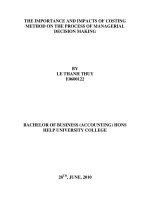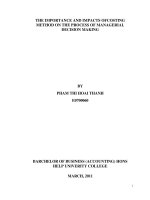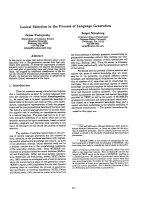THE PROCESS OF WRITING
Bạn đang xem bản rút gọn của tài liệu. Xem và tải ngay bản đầy đủ của tài liệu tại đây (62.25 KB, 3 trang )
<span class='text_page_counter'>(1)</span><div class='page_container' data-page=1>
<b>THE PROCESS OF WRITING</b>
Writing, like speaking, is a productive skill. But while it is productive,
it is different from speaking because a writer is able to think more carefully
before communicating. A writer also has the advantage of changing what he
or she has written. Because of this, the process of writing is different from
the skill of speaking. Let us begin with a brief introduction to the writing
process. Some teachers and students have the idea that writing is a simple
exercise that looks something like this:
1. Teacher gives a topic
2. Students writes a composition
3. Students turns in the composition
4. Teacher grades and returns the composition
But actually, language teaching methodologists have discovered that good
writers use a much more complex process. This process can be summarized
as follows:
<b>1.</b> <b>Prewriting:</b>
In this stage of the process, writers think of many ideas. First, they
think about the topic they might write about. Then they form ideas related to
the topic. Finally they begin organizing those ideas. All of this happens
before they begin writing a draft of their composition.
Pre-writing activities:
<b>- Listing:</b> This is brainstorming a list of ideas for a
composition. It may be a list of general topics to write about or it may be
specific ideas and details for a given topic.
- <b>Free writing:</b> Simply begin writing words and sentences that
come to mind without paying attention to organization, spelling, or
grammar. If you have already chosen a topic, free write about the topic. If
you do not have a topic yet, just write whatever ideas come to your mind.
<b>- Looping:</b> Looping is a special kind of freewriting. First, the
students freewrite a short paragraph. Then they read what they just wrote,
and underline one important idea. They write a new paragraph about the idea
underlined. After writing a second paragraph, students read it and underline
the most important word in that paragraph, and use it as the topic of a third
paragraph. The purpose of looping is to start with a general idea and make it
more specific.
</div>
<span class='text_page_counter'>(2)</span><div class='page_container' data-page=2>
middle of a blank piece of paper, and draw a circle around. Then around the
circle they draw lines, and at the end of each line they write a detail about
the teacher, such as appearance, personality, style, and memories about the
teacher. Then they circle each of these details and draw lines to specific
points about them.
<b>2.</b> <b>Writing:</b>
The next stage in the process involves taking the idea from prewriting
and putting them into a roughly written composition. This is not a perfect
copy of the composition; it is only an attempt to begin the essay. Writers
often begin the writing stage without knowing exactly what they want to
say. But as they write, they get new ideas and it becomes dearer to them
what they want to communicate. They cannot see the final product from the
beginning. Instead, writers develop their thoughts as they write. Before,
many thought that the writing process ended with a written draft. But
actually, a very important stage follows the writing step: Revising.
<b>3.</b> <b>Revising:</b>
My favorite
teacher
Not very pretty
Loved her
student What I <sub>learned</sub>
smart
Broken
teeth
Praised us kindness
</div>
<span class='text_page_counter'>(3)</span><div class='page_container' data-page=3>
The last stage of writing may greatly change the composition. In
revising, writers must remember that a piece of writing can always be
improved and they should be willing to add, remove or change text they
have already written. Part of revising is editing the composition by
rearranging paragraphs and sentences, improving the choice of words,
grammar, and structure. Sometimes, the writer may realize later in the
process that he or she did not include all the important ideas during the
prewriting stage. Because of this, even during the revising stage, writers
may go back and do a little more prewriting. The final part of this stage of
the process is proofreading for any mistakes.
As one can see from this description, the writing process is more
complex than just writing a composition once and trying to correct the
errors. Teachers can help their students became good writers by teaching
them the process of writing.
</div>
<!--links-->









